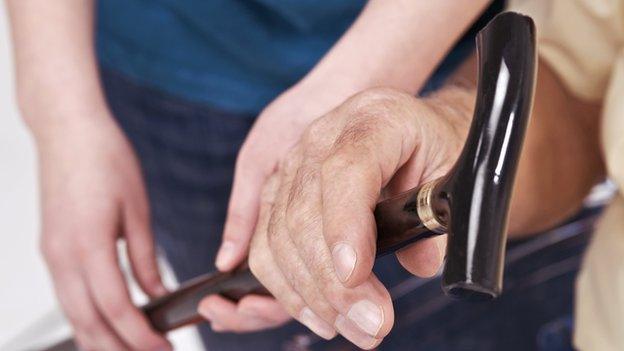The hidden army of carers
- Published
- comments

Some 6.5m people described themselves as carers in the last Census
The state of the NHS and social care system is never far from the headlines.
There are 1.4m people working for the health service and a similar number staffing care homes and providing vital home help. But these figures are dwarfed by a hidden workforce - the UK's army of carers.
Some 6.5m people identified themselves as carers in the last Census - that's one in eight adults in the UK. Over the next 20 years that number is expected to grow to 9m.
Some of these people are just providing a few hours care a week for someone, but significant numbers are doing much more - and according to new research need greater help.
Over 40% report having to reduce the amount they work to care, while 1.4m provide over 50 hours of unpaid care a week. The "full-time carers" are the biggest growing group in the carers' army.
Of course, it is easy to assume this is a natural part of the life-cycle. As loved ones grow older and frailer many would say it is quite right that those close to them help.
Indeed, that is the approach many carers take themselves. I recently interviewed a woman called Wendy Prosser, who is in her 70s and cares for her husband who has been left with mobility issues following a brain tumour.
He needs round-the-clock help. But Ms Prosser refuses to feel sorry for herself.
She told me: "This is what I have got to do. The NHS saved Neil's life.
"It gave us eight years we would not have had otherwise so it is my responsibility to look after him. I'm never going to let or expect anyone to help us. That wouldn't be right."
Depression
Caring can involve anything from help washing and dressing to looking after people with dementia.
However, there are signs the burden on carers is unsustainable. The ageing population means there is a growing number of elderly carers.
A nation of carers
6.5m
carers in the UK
-
38% increase expected in their number by 2034
-
1.4m provide 50 hours of unpaid care per week
-
┬ú119▓·▓È estimated amount carers save the UK economy per year
Nearly 1.3m people over the age of 65 are carers - a rise of over a third since 2001, according to Carers UK.
What is more, many carers report that their responsibilities place a physical, mental and financial burden on them. A survey commissioned for Carers Week this week shows that only a third feel they get enough support.
Depression is a common problem with 61% reporting they have struggled with the condition. Half also say they are losing out financially.
Hel├®na Herklots, the chief executive of , says the survey should act as a "wake-up call".
"As a society we need a much wider understanding of the realities of caring," she says.
This matters on both a societal and individual level. The support provided by carers is worth in excess of £100bn, according to estimates.
That is a staggering sum that takes into account both the cost for social care and the NHS, which granted are notoriously difficult to estimate.
Nonetheless, you can bet the pressures on the health and care services would be far greater than they currently are without these carers.
And on an individual level, it is fair to say all of us have a stake in how carers are supported. Why? Six in 10 are will become one at some point, while most of the rest will need the help of one.